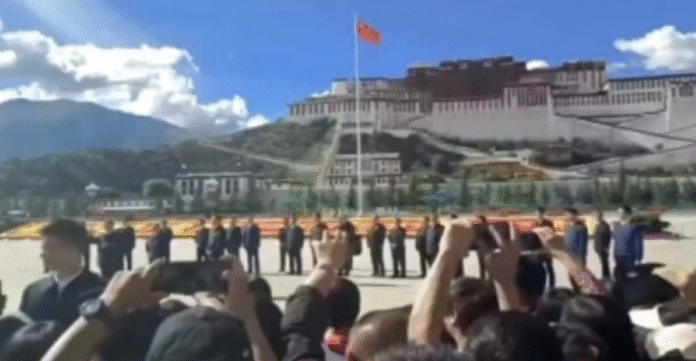BEIJING– China has stepped up a sweeping campaign of digital authoritarianism in Tibet since 2019, cutting off Tibetans from one another, their diaspora and the outside world, and accelerating the erosion of cultural identity, according to a report.
The findings, published in the Tibetan Review by journalist Aritra Banerjee, detail how Beijing uses technology to suppress religion, free speech and dissent. Authorities regularly enforce internet shutdowns during politically sensitive events such as the March 10, 1959 uprising anniversary, the Dalai Lama’s birthday, or local protests. In 2024, a complete blackout was imposed during demonstrations against the Derge dam, while police used digital forensics to trace and arrest protesters.
“The Great Firewall of China blankets Tibet, blocking platforms like Google, WhatsApp and YouTube, while censoring all references to the Dalai Lama, independence and human rights,” Banerjee wrote. “By 2023–2024, Tibetan-language livestreams and videos were banned on Douyin, Kuaishou and Bilibili, while minority language content was systematically scrubbed.”
Offline restrictions have mirrored online censorship. The Gangjong Sherig Norbu Lobling school, a Tibetan-language institution that operated for three decades, was shut down in July 2024. At the same time, Tibetan websites and cultural accounts disappeared, underscoring what the report called a “dual strategy of suffocating cultural life in both physical and digital spaces.”
Since 2021, at least 60 arrests have been recorded for phone and internet-related offences, including sharing photos or joining chat groups. More than 1,000 Tibetans were detained during protests along the Drichu River in early 2024. Police inspections of phones are frequent, especially in monasteries and public spaces, while residents are encouraged to monitor one another, with rewards of up to 100,000 RMB offered for reporting “digital dissent.”
Surveillance has become pervasive, the report said, with Tibet divided into “grid units” monitored by security forces and AI-enabled cameras. Citizens are pressured into installing the “National Anti-Fraud Centre” app, giving authorities access to contacts, GPS data, calls and biometric details. Monks and nuns face particular scrutiny, with online religious activity treated as illegal.
Exiles in Switzerland and elsewhere also report intimidation, with families in Tibet threatened over their relatives’ political activity abroad. As a result, many avoid contact with loved ones at home.
“The purpose is clear: assimilation and Sinification,” Banerjee argued. “By severing communication, Beijing seeks to dismantle Tibet’s cultural identity and eliminate the potential for organised dissent. Tibet serves as both a frontier and a laboratory, where the Chinese Communist Party perfects repressive technologies later applied in Xinjiang — and potentially exported overseas.” (Source: IANS)














